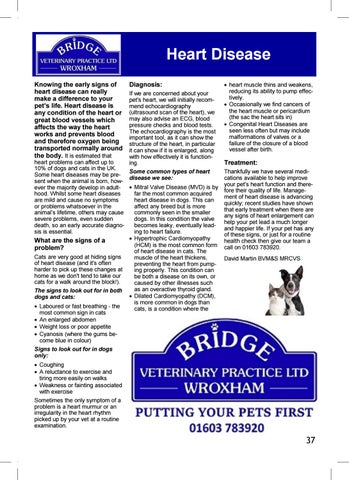Heart Disease Knowing the early signs of heart disease can really make a difference to your pet’s life. Heart disease is any condition of the heart or great blood vessels which affects the way the heart works and prevents blood and therefore oxygen being transported normally around the body. It is estimated that
Diagnosis: If we are concerned about your pet's heart, we will initially recommend echocardiography (ultrasound scan of the heart), we may also advise an ECG, blood pressure checks and blood tests. The echocardiography is the most important tool, as it can show the structure of the heart, in particular it can show if it is enlarged, along with how effectively it is functioning. Some common types of heart disease we see:
heart problems can affect up to 10% of dogs and cats in the UK. Some heart diseases may be present when the animal is born, however the majority develop in adult- · Mitral Valve Disease (MVD) is by hood. Whilst some heart diseases far the most common acquired are mild and cause no symptoms heart disease in dogs. This can or problems whatsoever in the affect any breed but is more animal’s lifetime, others may cause commonly seen in the smaller severe problems, even sudden dogs. In this condition the valve death, so an early accurate diagnobecomes leaky, eventually leadsis is essential. ing to heart failure. · Hypertrophic Cardiomyopathy What are the signs of a (HCM) is the most common form problem? of heart disease in cats. The Cats are very good at hiding signs muscle of the heart thickens, of heart disease (and it's often preventing the heart from pumpharder to pick up these changes at ing properly. This condition can home as we don't tend to take our be both a disease on its own, or cats for a walk around the block!). caused by other illnesses such as an overactive thyroid gland. The signs to look out for in both · Dilated Cardiomyopathy (DCM), dogs and cats: is more common in dogs than · Laboured or fast breathing - the cats, is a condition where the most common sign in cats · An enlarged abdomen · Weight loss or poor appetite · Cyanosis (where the gums become blue in colour) Signs to look out for in dogs only:
· heart muscle thins and weakens, reducing its ability to pump effectively. · Occasionally we find cancers of the heart muscle or pericardium (the sac the heart sits in) · Congenital Heart Diseases are seen less often but may include malformations of valves or a failure of the closure of a blood vessel after birth.
Treatment: Thankfully we have several medications available to help improve your pet's heart function and therefore their quality of life. Management of heart disease is advancing quickly; recent studies have shown that early treatment when there are any signs of heart enlargement can help your pet lead a much longer and happier life. If your pet has any of these signs, or just for a routine health check then give our team a call on 01603 783920. David Martin BVM&S MRCVS
· Coughing · A reluctance to exercise and tiring more easily on walks · Weakness or fainting associated with exercise Sometimes the only symptom of a problem is a heart murmur or an irregularity in the heart rhythm picked up by your vet at a routine examination.
Please Keep Safe! 29 37









